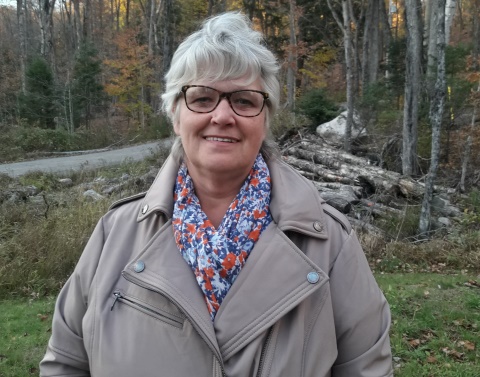Just one of the many lessons Mireille “Mimi” Mitchell has taken to heart as an RN in the community and elsewhere.
By Jonathan Sher
Four decades before RN Mireille Mitchell rose to oversee risk and quality for the Victorian Order of Nurses (VON), 12-year-old “Mimi” managed risk of another sort, displaying the sort of demeanour and acumen that would propel her journey as a nurse.
Asked to handle the register at the corner store owned by her parents in Verner, ON, Mitchell watched a woman slip products into her pocket and head to the counter with a few cheaper items in her hands. Mitchell punched in the prices and stated the real total. When the woman cursed, Mitchell explained she had charged her for the items in her pockets. When the woman shouted and threw coins at her, Mitchell calmly lifted the hidden phone, the one that sounded in her family home next door, and her father arrived by her side in seconds.
The eighth of nine children, Mitchell was born and raised on the Quebec side of the Ottawa River in Témiscaming. It was there, at the age of three, that she declared she would be a nurse, a pursuit her parents encouraged even though no one in the immediate or extended family had ever gone beyond high school.
Married in 1985 and living in Hamilton, Mitchell applied and was accepted to the Mohawk College nursing diploma program. But the same week she received that news, she found out something else: She was pregnant.
About five years and two children later, Mitchell officially enrolled at Mohawk while also working as a registered practical nurse (RPN) at a long-term care home. In her third year, she did placements in three clinical environments: the burn trauma unit at Hamilton General; a medical unit at McMaster University Hospital; and at a rehab facility called Chedoke Hospital.
While she loved front-line nursing, by 1996 she wanted more. That year, she started an online baccalaureate degree program at Charles Stewart University in Australia. She believed it would be her doorway to become an educator and manager.
That same year, Mitchell was hired by VON, an organization that she says had become a magnet for top nursing talent. “There was no safety net,” she explains of nursing in the community vs. acute care. “You have to think on your feet. You never know what you’ll see on the other side of the door.”
One encounter sticks out. Mitchell was visiting a dairy farmer northwest of Hamilton to inspect his catheter. Rather than use sterile bags he said he couldn’t afford, the farmer rigged his own system, hooking a tube from his abdomen to scrap pieces of milking line, then to a household tap. Another length of milking line, which he placed inside a whiskey jug, completed the home-made system.
Rather than push him to immediately buy bags, Mitchell focused on building a rapport and gaining his trust. She explained that whatever he used, he needed to keep it clean. Only after his infection eased did Mitchell explain he might qualify for funding to acquire bags, and later, he agreed.
Don’t preach. Teach. That was her approach.
After five years with VON, some of the organization’s work in the area was given to another provider contracted by the government, a turn of events that left Mitchell with part-time hours. She moved on, later working for Telehealth Ontario, where she’d put in eight years. “You needed to be efficient and quick. I learned a lot about different diseases,” she says of that experience.
Mitchell returned to VON in 2016 and became quality and risk manager. In this role, she evaluates critical incidents and seeks out patterns or problems that might require systemic reform, both in how care is delivered and money is managed.
One problem in home care remains beyond her grasp to correct: community nurses are paid far less than their hospital counterparts. That gap, as much as 20 per cent in some cases, causes good home care nurses to leave, and their exodus destroys the continuity of care that is so critical to patients. “Nurses are not leaving by choice, but because of financial necessity,” she says.
This article was originally published in the September/October 2018 issue of Registered Nurse Journal, the bi-monthly publication of the Registered Nurses’ Association of Ontario (RNAO). You can read more about RNAO’s advocacy on the issue of pay equity in Enhancing Community Care for Ontarians (ECCO), a white paper released in 2014. Visit RNAO.ca/ECCO to read the report and supporting resources.
Jonathan Sher is senior writer for RNAO, the professional association representing registered nurses, nurse practitioners, and nursing students in Ontario. Since 1925, RNAO has advocated for healthy public policy, promoted excellence in nursing practice, increased nurses’ contribution to shaping the health-care system, and influenced decisions that affect nurses and the public they serve. For more information about RNAO, visit RNAO.ca or follow us on Facebook and Twitter.




